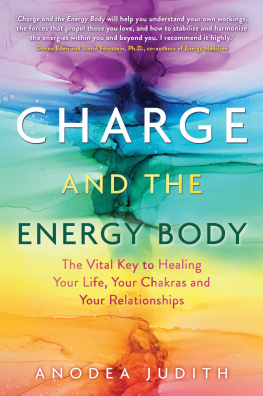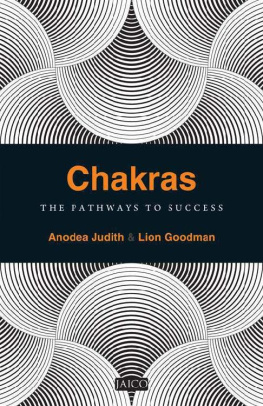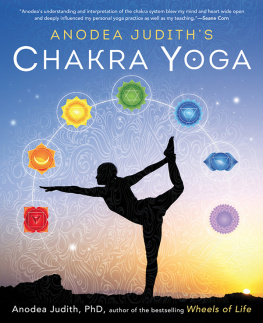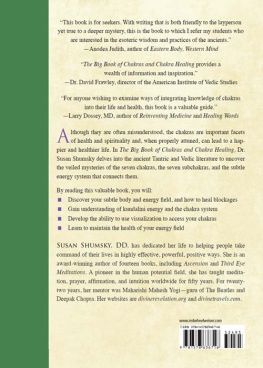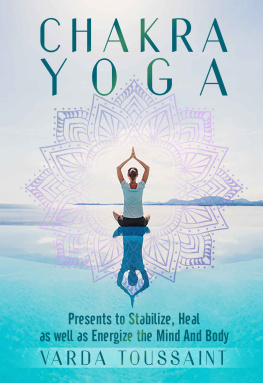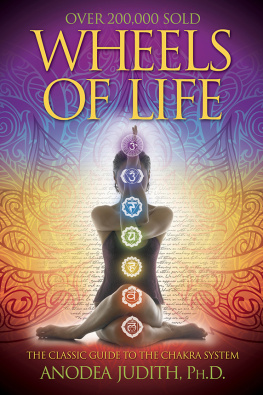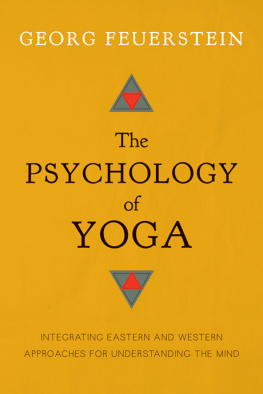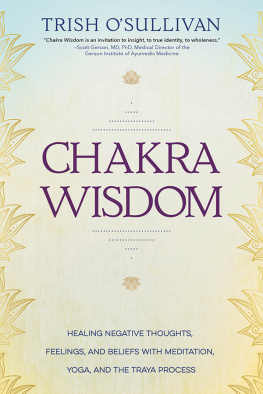Praise For
EASTERN BODY, WESTERN MIND
Its a rare book indeed that is immediately accessible and relevant to daily life and, at the same time, well-researched and scholarly. Eastern Body, Western Mind is that kind of special work. It is sure to become the classic text on the chakras and their relation to Western psychologies. It provides a clear framework to wholeness and transformation that makes a major contribution to the evolution of humankind.
Joan Borysenko, Ph.D., author of Minding the Body, Mending the Mind and Inner Peace for Busy People
Eastern Body, Western Mind is the most well organized, readable description of the deep order of manifestation of Supreme Consciousness within the human body-mind ever written. This absolutely brilliant synthesis of the chakra system and the heart of Western psychology should be studied regularly by every yoga teacher, bodyworker, psychotherapist, healer, and spiritual seeker.
John Friend, founder of Anusara yoga
Fresh, accessible, and seamlessly cross-cultural, Eastern Body, Western Mind creates the perfect melding of the Eastern chakra system and Western Jungian psychology. One of the next tasks for humankind is to integrate these two different but complementary worldviews, and Anodea Judith has taken a giant step in that direction.
Leonard Shlain, author of Sex, Time, and Power and The Alphabet Versus the Goddess
A book of profound and practical compassion. Judiths ideas are as essential and important as Freuds insights were a hundred years ago. She offers specific and varied strategies to understand your ways of coping, so that you can let go of those that no longer serve you and make better use of those that do.
James Fadiman, Ph.D., author of Unlimit Your Life and The Other Side of Haight
This very readable yet scholarly book provides a comprehensive picture of healthy human development and the development of human consciousness. We are taken, step by step, on a journey toward the integration of body, mind, and spirit. A groundbreaking contribution.
Susan Campbell, author of Getting Real and Truth in Dating
Rather than presenting an esoteric borrowing from Indian culture, Judith employs the metaphoric language of the chakra system within the context of modern psychology. Her clear organization and numerous charts make browsing for subjects of personal relevance a breeze. The book provides a useful tool for contemplating our strengths, weaknesses, and appropriate approaches to growth.
Yoga Journal
sparkles with insight. Spiritual seeker, client, and therapist alike will find treasures here.
PanGaia magazine
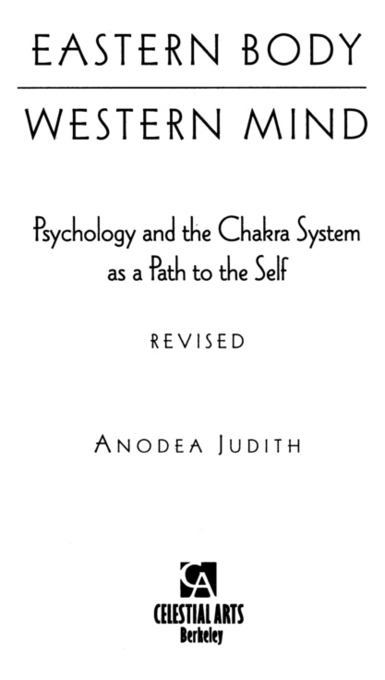
For information on the authors workshops, please contact:
S ACRED C ENTERS
708 Gravenstein Hwy N. #109, Sebastopol, CA 95472
www.sacredcenters.com
Copyright 1996, 2004 by Anodea Judith
All rights reserved. Published in the United States by Celstial Arts, an imprint of the Crown Publishing Group, a division of Random House, Inc., New York.
www.crownpublishing.com
www.tenspeed.com
Celestial Arts and the Celestial Arts colophon are registered trademarks of Random House, Inc.
Library of Congress Cataloging-in-Publication Data
Judith, Anodea, 1952
Eastern body, Western mind : psychology and the chakra system as a path to the self / Anodea Judith Celestial Arts.Rev. ed.
p. cm.
1. ChakrasMiscellanea. I. Title.
BF1442.C53J8 2004
150.198dc22 2004010256
eISBN: 978-0-307-77793-5
v3.1
CONTENTS
ACKNOWLEDGMENTS
I ris, the Greek Goddess of the Rainbow, was the first deity I ever encountered. It is to Her that I owe my discovery of the chakras and the Rainbow Bridge. However, in my journey across this bridge I have been supported by a great number of peoplemy clients, students, teachers, friends, and family.
Of particular importance, I thank my immediate family who lived with me while I wrote this book. My son, Alex Wayne, allowed me to tell stories about him in the text and helped draw up the computer graphics. My husband, Richard Ely, gave me love, support, and patient editing. Selene Vega, coauthor of The Sevenfold Journey and coteacher of the Nine Month Chakra Intensive, helped develop this work over the years, as well as giving me wonderful support, editing, and feedback. I would like to thank Lisa Green for her feedback on child development, Jack Ingersoll for his lengthy discussions on Jungian psychology, and Nancy Gnecco for her contributions to the charts. I would also like to thank my agent, Peter Beren, for making this publication possible, and David Hinds of Celestial Arts.
Most of all, Id like to thank those who have dared to engage in the healing process with me as your guide. From you I have learned the most. It has been a privilege to serve you.
PREFACE TO THIS EDITION
S ince this book was originally published in 1996, the chakra system has come of age in the West. Yoga centers are growing exponentially, teaching asanas and meditations that open the chakras. Theories of energy healing are influencing the practice of both medicine and psychotherapy, creating a hunger for new models. Chakras now appear on T-shirts, candles, and jewelry, in sitcom conversations and articles in Time magazine. The idea that mind and body exist on a spiritual continuum has finally entered the mainstream. The good news is that it makes the chakra system accessible to more people as a template for transformation. The shadow side of this exposure is that, at least in the West, any cultural meme that gets seized by the collective consciousness runs the risk of trivialization, thus diluting its power.
At every workshop, lecture, or book signing, people come up to me asking whether I have a simple way to clear their chakras. Few of them understand what a chakra actually is, fewer still have familiarity with the ancient Tantric yoga tradition from which this system originates, and even fewer still are willing to delve into the depths of their own psyches and actually do the work required to make lasting changes in their inner and outer life. While some of the modern techniques of chakra energy work can bring tangible shifts in the way we feel, it is my opinion that these changes are often short-lived if we dont roll up our sleeves and do deeper work on the souls journey of healing and awakening.
It is to this challenge that I address this book. It will teach you an elegant system for understanding your health and imbalances, yet one that is richly complex. You will not find one-size-fits-all formulas that apply equally to all people or all situations. Instead, you will learn universal principles that can be effectively applied with careful consideration and understanding. You will learn, for example, that some of your chakras may be too open, with poor discrimination and filters, while other chakras can get mired in avoidance patterns and remain closed. You will learn how these unconscious defense patterns create excessive and deficient coping strategies that over time throw your system out of balance and alignment, affecting the bodys health and your quality of life. You will learn that these vital energy centers open sequentially during crucial stages of childhood, and can be unwittingly shut down by well-meaning parents whose own centers were compromised. You will learn about your upward and downward currents of energy, and how each has a different purpose in the liberation and manifestation of your life force. And you will learn about the work required to reclaim the true aliveness that is your birthright.


